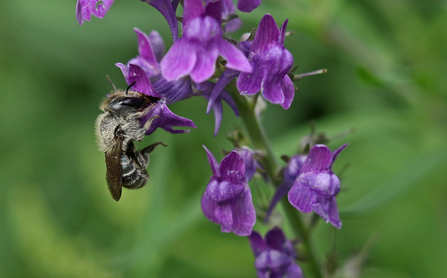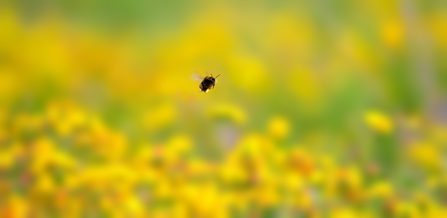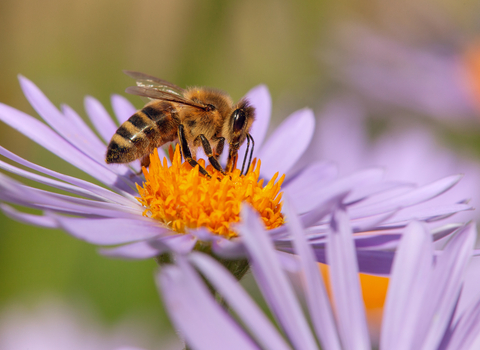Big win for bees - January 2025 update
The UK Government has not granted any emergency authorisation for the use of the neonicotinoid pesticide Cruiser SB, after it was requested by British Sugar for use on sugar beet crops.
This is the first time in five years that the government has rejected emergency use, after evidence shows that neonicotinoids are extremely toxic to pollinators and the wider environment.
Joan Edwards, Director of Policy and Public Affairs at The Wildlife Trusts, said:
“For years, experts and more than 300,000 wildlife supporters have called for the ban against neonicotinoids to be upheld and The Wildlife Trusts are delighted with this decision.
“There is simply no place in modern sustainable agriculture for highly toxic pesticides that kill bees and poison soils and rivers. Neonicotinoids were originally banned in the UK in 2017 but were granted repeat authorisations for use, despite explicit guidance against their approval.
“Many farmers across England have already turned their backs on these devastating chemicals. It’s time for British Sugar to take greater responsibility, and pay growers a fair price for producing beets without neonicotinoids.
“The focus must now be on a complete, sustainable transition away from a reliance on the use of neonicotinoids not just in agriculture, but also in pet flea treatments. This is a key source of chemical pollution in our waterways, with 10% of UK rivers found to contain toxic neonicotinoid chemicals.”
Thank you to all our supporters who have signed the e-petition and campaigned alongside us to get this authorisation rejected.

Wendy Carter
Background
Neonicotinoids are a group of pesticides that are highly harmful to the environment and wildlife. They are particularly dangerous for bees. Even a tiny amount of these chemicals can kill huge numbers.
A miniscule trace can disrupt a bee’s ability to navigate and reproduce, with long-lasting consequences for their survival. When neonicotinoids are washed into streams and rivers they are extremely toxic to aquatic invertebrates and further pollute our already struggling waterways.
Due to their environmental impact, neonicotinoids were banned for outdoor use in the UK in 2018.
Yet, for the past four years, the UK Government has approved so-called ‘emergency authorisations’ made by the company British Sugar for the use of the highly damaging neonicotinoid, thiamethoxam, on sugar beet. New research shows impact of neonicotinoid pesticides on UK rivers.
The decisions to grant emergency authorisations have been made to protect sugar beet crops from the impact of Virus Yellows. However, in all four years the authorisation has been granted so far, the Government’s decision to allow the use of thiamethoxam on sugar beet went against their own expert advice. Both the Health and Safety Executive and the Expert Committee on Pesticides advised against authorising neonicotinoids, even in cases where the potential impact from Virus Yellows was high, as the risks to the environment far outweigh any benefits to the sugar beet industry. Read the advice of the Expert Committee on pesticides.
These decisions also ignore the 100,000+ members of the public who appealed to the then-Prime Minister in 2021 to reverse the first 'emergency' authorisation, undermine farmers who are working with nature to reduce their pesticide use, and runs a bulldozer through the Government's legally-binding commitment to halt species decline by 2030.
The UK Government must uphold its commitments to protect nature, reduce the impact of pesticides, and champion nature-friendly farming.

Jon Hawkins, Surrey Hills Photography
Farmers are proving it’s possible to grow sugar beet without these chemicals: last year 40% of sugar beet farmers chose to use alternatives.
The Wildlife Trusts
Got more questions?
Find answers to some of the most frequently asked questions below.
What happened in previous years?
On the 23rd January 2023 following lobbying from the sugar industry, the UK Government announced its decision to grant an “emergency authorisation” for the use of a product containing the banned neonicotinoid thiamethoxam to treat sugar beet seeds in 2023. This follows the approval of similar applications for growing seasons in 2021 and 2022, where the use of banned neonicotinoid pesticides was permitted across more than 91,000 hectares of countryside in England.
These chemicals are known to have disastrous effects on UK wildlife. The Wildlife Trusts have consistently opposed a derogation due to the known environmental harms it causes and has criticised the flawed - and legally unsustainable - decision-making process the Government has used.
Evidence shows at least 50% of insects species have been lost since 1970, and the shocking reality that 41% of the Earth's remaining insect species are now 'threatened with extinction’. Farmers should not have to choose between farming and nature. We continue to call for proper, long term support for farmers to adopt non-chemical alternatives which are proven to support nature.
I thought neonicotinoids were banned? Why has this happened?
Over the past three years (2021, 2022, and 2023) the UK Government has granted emergency authorisation of this banned product.
The company British Sugar has requested ‘emergency’ authorisation in an effort to control aphid populations in sugar beet. This is because aphids are known to spread a disease called Beet Yellows Virus (BYV), which has the potential to reduce sugar beet yields significantly if left unchecked. Previous applications for the emergency use have been made by British Sugar who have pushed for the authorisation of the pesticide seed treatment to deal with “unprecedented” peach potato aphid Myzus persicae infestations (which carry Beets Yellows Virus) seen in 2020.
Under the emergency authorisation process, the application is considered by the Health & Safety Executive (HSE) and the Expert Committee on Pesticides (ECP). In all three years, the Government’s decision to allow the use of thiamethoxam on sugar beet went against the expert advice provided to the Government by both the HSE and ECP which advised that the risks to wildlife were too high, and that thiamethoxam should not be used even if the national incidence of Beet Yellows Virus was forecast to be high.
But the Government says this is just temporary and for use in an emergency, so what’s the problem?
The Wildlife Trusts are concerned that the powers granted under the legislation are being abused to authorise the regular and routine use of banned chemicals. This is in direct contradiction of the 2018 ban of neonicotinoids, jeopardises the Government's legally binding targets set out in the Environment Act, and undermines promises made internationally to reduce the impact of pesticides.
The sugar industry has requested an ‘emergency authorisation’ for the use of the banned chemical thiamethoxam four years in a row, despite saying they would only need it for a maximum of three years. However, the legislation which underpins this process clearly states that the authorisation must only be used to allow the limited and controlled use of a chemical for a “period not exceeding 120 days”.
Each year, more research is published on the devastating impacts of neonicotinoids, including the chronic non-lethal effects of these chemicals which can persist for years in the environment. It’s becoming clear that this ‘temporary’ measure will have long-lasting effects on our pollinators.
Increasingly, the UK is experiencing milder and wetter winters, so the issue of virus in sugar beets will likely only increase in future years. This is why it is critical to support farmers to transition away from harmful chemicals that threaten the future of our farming and natural systems. Continuing short-term options to tackle the effects on crops from pest impacts which will only get worse with climate change is short-sighted, and does not help farmers take a long-term, integrated approach to pest management.
What have The Wildlife Trusts done about this?
The Wildlife Trusts are shocked that this request has been put forward again, and we’ve challenged the decision to allow the use of thiamethoxam in each of the past 3 years, citing overwhelming evidence demonstrating the terrible impacts of Thiamethoxam on bees and wider wildlife in the UK. We strongly oppose British Sugar’s requests.
In 2021, the first year of the authorisation, The Wildlife Trusts released a public statement clarifying our position and concerns and launched a petition urging the then-Prime Minister to use his powers to overturn the authorisation which reached over 100,000 signatures.
In 2022, The Wildlife Trusts again opposed the decision to authorise thiamethoxam. We issued a press release calling on the Secretary of State to reverse the decision, and initiated a campaign that allowed members of the public to contact their MP on Twitter or via email to express their opposition. This campaign led to a Westminster Hall debate in the Houses of Parliament which debated the decision to allow banned neonicotinoids on British soils.
In 2022 The Wildlife Trusts also explored possible routes for legal action against the decision . We submitted a legal letter to the Government that outlined our opposition on the grounds that it went against expert advice and the conditions for emergency authorisation were not met. However, by the time a case would have been considered, the neonicotinoid-treated sugar beet seeds would have already been planted, so any legal action would have been deemed academic.
In 2023, the Government’s decision to grant the authorisation was accompanied by stricter conditions, including a raise in the virus threshold needed for authorisation (the level of predicted virus incidence needed before farmers are allowed to apply neonicotinoids), but still went against the explicit advice of the Government’s independent experts. In what was becoming a Groundhog Day process, The Wildlife Trusts issued a press release, published blogs and other social media posts challenging the decision.
Isn’t sugar beet a non-flowering crop? How can it affect bees?
The Government has stated that authorised applications will have to comply to strict conditions to ensure that wildlife is not harmed, but this assertion does not stand up to scrutiny:
- The authorisation allows “seed-dressing” of sugar beet crops with neonicotinoid pesticides, a method of application that results in only 5% of the pesticide going where it is targeted, in the crop[i]. The rest ends up accumulating in the soil, from where it can be absorbed by the roots of wildflowers and hedgerow plants, with fatal impacts on any pollinators that visit them.
- Furthermore, the chemical can leach into rivers and streams where it could harm over 3,800 invertebrate species, which spend at least part of their life cycle in freshwater.
References
[i] 0 Sur, R. & Stork, A. (2003) Uptake, translocation and metabolism of imidacloprid in plants. Bulletin of Insectology, 56, 35–40
How else do you expect farmers to deal with pests?
Through continued research into disease-resistant varieties and Government support for Integrated Pest Management (IPM), sugar beet growers can move away from the reliance on highly damaging chemical pesticides.
There is growing evidence that it is possible to greatly reduce pesticide use while maintaining comparable crop yields if sufficient effort and support is made available to develop ecologically-based IPM methods. IPM is equally applicable to non-organic as well as organic farming, and to non-farming situations like parks and gardens. These techniques can also often be more profitable than traditional management, due to reducing the financial costs of chemical application.
Furthermore, since the refusal of emergency authorisation in 2018, the British Beet Research Organisation (BBRO) has conducted trials to assess varietal resistance to virus yellows. Of 12 varieties assessed in 2019, the BBRO reported that one variety in particular had no significant drop in yield when infested with beet mild yellowing virus and only a slight drop in yield (25 per cent) when infested with beet yellows virus; far lower levels than expected from a traditional susceptible variety[i].
References
[i] https://www.pan-uk.org/site/wp-content/uploads/United-Nations-Report-of-the-Special-Rapporteur-on-the-right-to-food.pdf
Lechenet, M., Dessaint, F., Py, G., Makowski, D., Munier-Jolain, N. (2017) Reducing pesticide use while preserving crop productivity and profitability on arable farms. Nature Plants 3: 17008 12
https://bbro.co.uk/research/crop-progression/crop-progression/project-summaries/
https://www.farmersguide.co.uk/increased-risk-of-virus-yellows-in-beet-crops-this-spring
What is an Integrated Pest Management System?
Integrated Pest Management (IPM) is an approach to managing pests, diseases or weeds in which chemical pesticides are used only as a last resort, if at all. Many IPM practices that replace toxic chemical applications are good for wildlife because they focus on creating healthy soils and whole-farm ecology rather than just field margins or features.

